#Palestine 194
Text
Julian Borger and Lorenzo Tondo at The Guardian:
The UN general assembly has voted overwhelmingly to back the Palestinian bid for full UN membership, in a move that signalled Israel’s growing isolation on the world stage amid global alarm over the war in Gaza and the extent of the humanitarian crisis in the strip.
The assembly voted by 143 to nine, with 25 abstentions, for a resolution called on the UN security council to bestow full membership to the state of Palestine, while enhancing its current mission with a range of new rights and privileges, in addition to what it is allowed in its current observer status.
The highly charged gesture drew an immediate rebuke from Israel. Its envoy to the UN, Gilad Erdan, delivered a fiery denunciation of the resolution and its backers before the vote.
“Today, I will hold up a mirror for you,” Erdan said, taking out the small paper shredder in which he shredding a small copy of the cover of the UN charter. He told the assembly: “You are shredding the UN charter with your own hands. Yes, yes, that’s what you’re doing. Shredding the UN charter. Shame on you.”
The Palestinian envoy, Riyad Mansour, pointed out the vote was being held at a time when Rafah, the southernmost town that is last haven for many Gazans, faced attack from Israeli forces.
“As we speak, 1.4 million Palestinians in Rafah wonder if they will survive the day and wonder where to go next. There is nowhere left to go,” Mansour said. “I have stood hundreds of times before at this podium, often in tragic circumstances, but none comparable to the ones my people endured today … never for a more significant vote than the one about to take place, a historic one.”
Friday’s resolution was carefully tailored over the past few days, diluting its language so as not to trigger a cut-off of US funding under a 1990 law. It does not make Palestine a full member, or give it voting rights in the assembly, or the right to stand for membership of the security council, but the vote was a resounding expression of world opinion in favour of Palestinian statehood, galvanised by the continuing bloodshed and famine caused by Israel’s war in Gaza.
Even before the vote in the assembly on Friday morning, Israel and a group of leading Republicans urged US funding be cut anyway because of the new privileges the resolution granted to the Palestinian mission.
The US mission to the UN, which voted against the resolution, warned that it would also use its veto again if the question of Palestinian membership returned to the security council for another vote.
“Efforts to advance this resolution do not change the reality that the Palestinian Authority does not currently meet the criteria for UN membership under the UN charter,” the mission’s spokesperson, Nathan Evans, said. “Additionally, the draft resolution does not alter the status of the Palestinians as a “non-member state observer mission”.
The other nations which voted against the resolution were Argentina, Czechia, Hungary, Israel, Micronesia, Nauru, Palau and Papua New Guinea. The UK abstained.
According to the resolution, the Palestinian mission will now have to right to sit in the general assembly among other states in alphabetical order, rather than in its current observer seat at the back of the chamber. Palestinian diplomats will have the right to introduce proposals and amendments, they can be elected to official posts in the full chamber and on committees, and will have the right to speak on Middle Eastern matters, as well as the right to make statements on behalf of groups of nations in the assembly.
But the resolution also makes plain that “the state of Palestine, in its capacity as an observer state, does not have the right to vote in the general assembly or to put forward its candidature to United Nations organs.”
The UN General Assembly voted 143-9 with 25 abstentions in favor of backing a bid to make the State of Palestine its 194th member and to grant more privileges as an observer state.
Further, the UNGA recommends that the UN Security Council reconsider the matter to grant the State of Palestine full membership. The US is likely to veto it.
Sadly, the US (along with 8 other countries such as Israel, Czech Republic, and Argentina) voted no in order to protect Israel Apartheid interests.
#United Nations#UN Security Council#UN General Assembly#UNGA#State Of Palestine#Palestine#Israel#Palestine 194
13 notes
·
View notes
Text
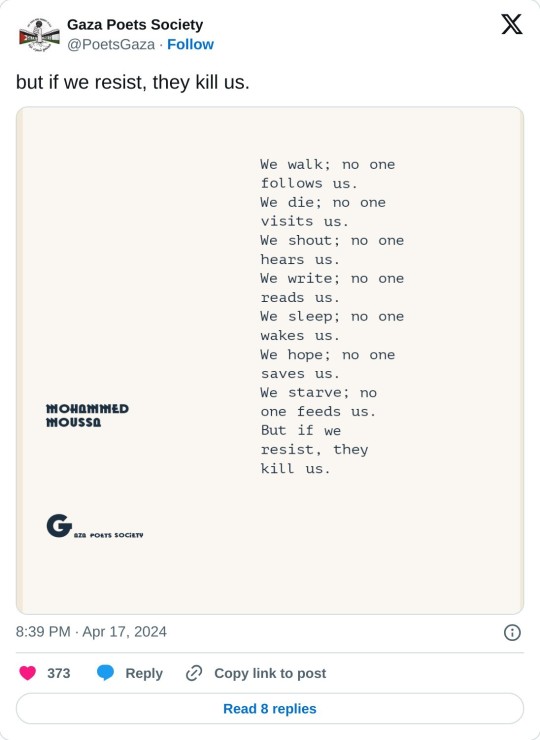
We walk; no one follows us.
We die; no one visits us.
We shout; no one hears us.
We write; no one reads us.
We sleep; no one wakes us.
We hope; no one saves us.
We starve; no one feeds us.
But if we
resist, they kill us.
Mohammed moussa
gaza poet society
83 notes
·
View notes
Text
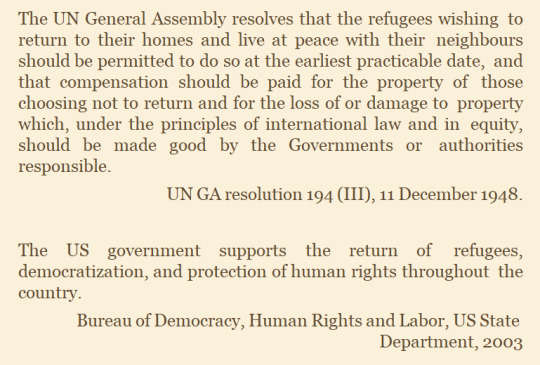
The Ethnic Cleansing of Palestine - Ilan Pappé (2006)
#the political bureaucratic 'thoughts and prayers' (absolutely useless)#UN GA resolution 194#bureau of democracy#us state department#1948#2003#right of return#refugees#gaza#The Ethnic Cleansing of Palestine#Ilan Pappé#Palestine#Israel#Free Palestine#Free Gaza#ethnic cleansing#zionism#nsnv#colonialism#atypicalreads#politics#history#state of israel#ideology#nonfiction#Ilan Pappe
0 notes
Note
Hi do you have any posts on the BDS movement? I think most don’t oppose it solely because it calls for a boycott of Israel, but because the org has unnecessarily called for boycotts found unjust and apparently doxxed Jewish people.. do you know anything about that?
I have a rant on them here, but not a lot else. But put simply, I think they are evil. they have doxed Jewish people, there was the whole map debacle, and they often used highly antisemitic rhetoric.
BUT WAIT, THERE'S MORE!
the art boycott is pissing me off. working to isolate Israel from the global art world is fucked (how are people supposed to be exposed to other opinions if you refuse to let them interact?), but the people that suffer the most from it are Palestinian. the worst tendency of it is that if a Palestinian artist want to preform before Palestinians within the green line, they face huge backlash, and often just cancel their shows. And I can tell you that arranging shows in Gaza in fucking hard due to both Hamas's religious fundamentalism and Israel and Egypt's sieges, and the West Bank is tough because of Israel's tight ass border control that is so fucking annoying that many artists don't have the ability to fight with! So they are helping to keep Palestinians culturally isolated!
AND this block Israelis from interacting with big name international Palestinian artists which is making my life harder when I am trying to expose Israelis to Palestinian culture in order to deradicalize them! Also, I have some Palestinian artists I would like to see and it suck that the BDS will give them such hell for that, that it might not be a possibility.
I understand the desire to vote with your money, to boycott, and I give zero fucks about it. your money, your choice. My problem is how violent it is, how it attacks everyone, how they spew hate and malice. I have no problems for the original core values of the BDS (ending the occupation in the west bank, having full equality for Arab-Israelis and following Resolution 194), even if I disagree with the phrasing of some. but over the years there have been calls for violence against Jews (shoot a Jew is one of the more blunt ones), death threats against people who wanted to go to Israel, doxing and working with SJP (Students for Justice in Palestine). SJP in a shit show by itself, and often tokenise and drown Palestinian voices so a bunch of white American colonizers could play their fantasies of being oppressed and getting to be violent.
99 notes
·
View notes
Text
Palestine Summary from LetsTalkPalestine April 14 to April 21, 2024.
April 14.
Day 191
• 43 Palestinians killed, 62 injured in Gaza in last 24 hours
💰Israel likely spent $1bn+ to intercept & counter Iran's attacks yesterday
🇯🇴 Jordan summons Iranian ambassador after Iran warned Jordan could be next target if it cooperated w/ Israel. Jordan says it intercepted Iran's artillery in its airspace to protect citizens, despite causing shrapnel to fall on neighborhoods
🇺🇳 UNSC yet to reach consensus on Iran's strikes so no condemnation, but they also didn't condemn Israel's attack on Iran's consulate in Syria that triggered the retaliation
• Israel vows to "exact a price" after Iran's attack but no details. US trying to dissuade Israel + confirmed US won't participate
• Israel to mobilize 2 reserve divisions to Gaza, despite earlier withdrawal of most troops. Announced postponing of date of Rafah invasion
• Largest wave of Israeli settler attacks w/ IOF protection across West Bank, even amid Iran's attacks last night, so far killing 2 and injuring 55+
April 15.
Day 192
• 68 Palestinians killed, 94 injured in last 24 hours
🇮🇷 Israeli military chief threatens escalation vs Iran. Israeli war cabinet agrees to respond to Iran but divided on how. US insists won’t join attack. Iran says it wants to avoid escalation but will retaliate if Israel attacks
• Israeli settlers kill 2 Palestinians & injure 1 in Nablus as West Bank experiences escalating settler attacks
• 2 mass graves uncovered in north Gaza: 10 patients killed by Israel’s latest siege of al-Shifa Hospital + 20 decomposing bodies in Beit Lahia
• G7 condemns Iran’s recent retaliation on Israel, saying G7 is open to imposing sanctions on Iran & allies
• Israeli military ramps up airstrikes on displaced Palestinians in Nuseirat camp killing 4+, injuring 32 today
🇱🇧 4 Israeli soldiers injured after infiltrating Lebanese territory by explosive devices planted by Hezbollah
• Undercover Israeli special forces kill Palestinian & injure 2 while raiding home in Nablus (West Bank)
April 16
Day 193
• 46 Palestinians killed, 110 injured in last 24 hours
🇮🇷🇺🇸 Wall Street Journal: Pentagon reveals US involvement in intercepting Iranian projectiles, using intelligence and airspace access from initially hesitant Gulf countries (🇸🇦🇦🇪) as a "shield" to help Israel
• At least 11 killed, most of whom were children, in an Israeli attack on densely populated Maghazi refugee camp
🇮🇷🇯🇴 Iran labels Jordanian interception "strategic mistake" after it opened its airspace to Israel to combat Iran's recent retaliation
🍞 An Israeli attack on a police vehicle kills 8 aid enforcement officers working to distribute aid to starved northern Gaza
🇲🇦 Moroccan activist receives 5-year prison sentence for criticizing Morocco's normalization of relations with Israel
🇺🇳 UN to launch $2.8 billion global appeal, with 90% allocated to Gaza, citing reduced budgeting from initial $4 billion plan due to Israeli restrictions on distribution capabilities
April 17
Day 194 - Palestinian Prisoner’s Day
✊ Palestinians in West Bank rally for release of the 3,500 Palestinian captives held by Israel without charge. 9,000+ Palestinians are held captive by Israel, 5,000 of them since Oct
• 56 Palestinians killed, 89 injured in last 24 hours
💰 Israel approves 5-year $5bn plan to rebuild settlements around Gaza damaged on Oct 7
🇱🇧 18 Israeli soldiers injured by Hezbollah attack on Israeli military facility
🇪🇺 Top EU diplomats agree to impose sanctions on Iran soon, while refusing to sanction Israel
🇺🇸 Biden uses Iran attack to revive $14bn aid package to Israel & Ukraine that’s being stalled by Congress
• Google employees arrested after 9-hour sit-in protest against Google’s $1.2bn contract w/ Israel & Amazon
• HRW: Israeli settlers & soldiers “entirely uprooted” 7 Palestinian communities in West Bank since Oct, backed by top Israeli authorities
🇺🇳 UNSC to vote on resolution for Palestinian UN membership on Friday, US expected to veto
April 18
Day 195
• 71 Palestinians killed, 106 injured in last 24 hours
⚖️ Israel received intel that the International Criminal Court (ICC) may soon issue arrest warrants for Netanyahu & other leaders for war crimes. Israel is worried & lobbying to prevent it, hoping Germany & UK will help pressure the ICC
🇺🇳 US vetoed Palestine’s application for UN membership at the UNSC
🏥 30 bodies uncovered at an al-Shifa Hospital mass grave deliberately hidden by Israel. The bodies show signs of forced executions. Terrifyingly, it’s still unknown what happened to about 1,000 medical staff and journalists who were in the hospital when Israeli forces entered
• Israeli forces abduct 40 people in the West Bank yesterday, on Palestinian Prisoner’s Day
• Israel withdraws from Gaza’s Nuseirat refugee camp after brutal days-long attack, leaving 13,000 housing units destroyed, 75 Palestinians killed, 348 injured, and 100 missing under rubble
• Israeli attacks on Rafah today killed 11+ people including 5 kids
April 19
On Iran:
Israel’s attack on Iran.
Small drones were somehow launched from within Iran targeting an airbase in Isfahan. Iran shot them down, reporting no damage caused
It’s a limited response to Iran’s retaliation which launched drones & missiles at Israel after Israel attacked Iran’s consulate, killing 16. Israel is yet to confirm the attack but it told US last minute of the operation
The attack’s limited nature is Israel balancing US pressure to de-escalate while trying to show regional military dominance, consistent w/ reports that US & Israel agreed on a Rafah invasion in exchange for no Iran escalation. An anonymous Israeli official said it was to signal Israel’s ability to strike inside Iran
Iran is downplaying the incident, likely so they won’t have to respond. An official called it “reckless fireworks”
Unclear if Israel will attack again; Iran said they don’t plan to retaliate. Seems there’s no Iranian or Israeli desire to escalate, especially w/ mass global calls for de-escalation
-
Day 196
• Total death toll surpasses 34,000, including 10,000 women, but @ euromedhr puts the real number including the thousands missing under rubble at over 41,000
• Ongoing Israeli raid on Tulkarem (West Bank) since last night, concentrated on Nur Shams refugee camp as bulldozers cause widespread destruction; 5 Palestinians killed incl. a 16-year-old. Fierce battles between resistance fighters & Israeli forces, with IOF killing the leader of Tulkarem Brigades (local resistance group), marking an escalation. More info tomorrow [April 20]
🇪🇺 EU sanctions 4 Israeli settlers for committing violence against Palestinians
• Israeli airstrike on Rafah kills 7, injuring many others
🇺🇸 US sanctions 2 entities that raised money for US sanctioned Israeli settlers
• Columbia University authorized police to arrest 108 pro-Palestinian protesters on its campus
April 20
Israeli forces arrest dozens of Palestinian men in Nur Shams Refugee Camp in West Bank (middle east eye)
🚨 Ongoing 48-hour Israeli raid on Tulkarem causing worst destruction in the West Bank in decades
Fierce battles in Nur Shams camp in Tulkarem between Israeli soldiers & Palestinian resistance fighters who target IOF w/ explosives & gunfire, causing IOF casualties. Israeli drones hovering over Tulkarem since Thursday; reports of explosions & IOF sending reinforcements
Yesterday, IOF executed Mohammed Jaber, leader of Tulkarem Brigades (local resistance group), marking an escalation, but the group said it’ll continue to resist
4 other Palestinians killed, incl. a teen. Death toll likely to rise given ongoing battles. IOF claims to kill 10 Palestinian fighters
Today 11 were injured: 7 by bullets, 4 beaten by IOF soldiers. Videos show soldiers abusing the injured & blocking ambulances. 15+ Palestinians abducted by IOF (📹👆) + IOF seized homes to set up detention centers, forcing out families
Widespread destruction by IOF as 60+ military vehicles demolish homes, roads, shops & sewage lines
-
Day 197
• 37 Palestinians killed, 68 injured in last 24 hours, lowest daily death toll since start of the genocide (except for 1-week Nov truce)
🇺🇸 US sources say US will soon sanction 1 IOF unit for human rights violations in West Bank, to cut military aid & training. Would be 1st US sanction on Israeli military
🇺🇸 Congress passed aid bill giving $26.38bn to Israel, incl. $14bn unconditional military aid
‼️ Overnight strikes on Rafah kills 10+ people. Several Israeli surveillance drones hovering low & more troops on Rafah outskirts, suggesting an impending invasion
• Israeli settlers raid Ramallah, Hebron, al Saywah & Nablus, killing a Palestinian ambulance driver
• IOF raid of Tulkarem kills 14 Palestinians + army raided a hospital, attacked medical staff & abducted paramedics. For details scroll up
🚚 Gaza gov’t media office says only 130-150 aid trucks enter per day; not Israel & US inflated number of 300
💰 Israel considering raising taxes to fund more attacks on Gaza
April 21
Day 198
• 48 Palestinians killed, 79 injured in last 24 hours
• Israeli airstrikes on Rafah kill 24, incl. 18 children & 6 women; invasion seems imminent as Israeli intelligence drones hover low over Rafah
• In 2 incidents; 2 Palestinian teens + a woman were killed by IOF in West Bank, IOF claims they tried to stab soldiers
🏥 180 bodies deliberately hidden by Israel in a mass grave at Nasser hospital incl. elderly women & kids, expected to find 700 bodies buried. Many were found w/ their hands tied suggesting summary executions
• 7 Palestinians killed & many injured in Israeli strike targeting home in Nuseirat refugee camp (central Gaza)
🇺🇸 The report that US will soon sanction 1 Israeli military unit sparked harsh remarks from Netanyahu + Israeli minister asked US to reconsider the sanction, marking growing US-Israeli tensions
• Israeli forces continue Tulkarem raids (West Bank) after 3-day intensive raid of Nur Shams camp in Tulkarem that killed 14, incl. 3 kids + abducted 50
25 notes
·
View notes
Text
PINNED POST: this blog runs mostly on shuffled queue.
FAQ:
I throw 280 mph fastballs in the dirt (outside corner) ONLY.
I have a batting average of .999 and an OBP of .194.
I'm standing right behind you.
PRIORITY FUNDRAISER LIST FOR PALESTINE AND SUDAN ‼️🇵🇸🇸🇩
38 notes
·
View notes
Text
Last month, Philippe Lazzarini, the head of the United Nations Relief and Works Agency for Palestine Refugees (UNRWA), said that the agency had reached a “breaking point.” After Israel accused 12 agency personnel of involvement in the Oct. 7, 2023, Hamas attacks, 18 states announced in January that they would suspend funding to UNRWA, including its two top donors: the United States and Germany. On Saturday, the U.S. Congress barred funding to the agency through March 2025.
Although Lazzarini has dismissed 10 of the employees (the other two are dead), and the U.N. promptly launched an investigation into the allegation, most donor states have refused to resume funding until the investigation is finished. The European Commission, Sweden, and Canada have released some of their pledged funds, but the agency continues to exist “hand-to-mouth” amid the very real risk of being forced to shut its doors.
Now that Israeli Prime Minister Benjamin Netanyahu has outlined his postwar plans for the Gaza Strip, which include closing UNRWA, the agency’s future looks even more unstable. Yet to shutter UNRWA would be a betrayal of Palestinians. The agency, which provides essential services to 5.9 million Palestinian refugees, has been a stopgap for almost 75 years as the international community has failed to find a durable solution for Palestinians.
UNRWA—which I worked for between 2019 and 2022—cannot solve the root causes of Palestinians’ dispossession, but for decades, it has managed to address the symptoms. It has also become Palestinians’ only effective representative on the international stage. In the absence of a political solution, the international community owes it to Palestinians to ensure that UNRWA remains operational amid one of the worst humanitarian crises in its history.
UNRWA originated as a makeshift solution to a thorny problem. After the creation of the state of Israel in 1948 displaced around 750,000 Palestinians, the U.N. General Assembly (UNGA) passed two crucial resolutions. The first, Resolution 194, enshrined Palestinian refugees’ right to return to their homes and established the U.N. Conciliation Commission for Palestine to promote a durable solution for Palestinians. The following year, Resolution 302 set up UNRWA as a subsidiary organ of UNGA to conduct “direct relief and works programmes” that would incentivize Palestinians to settle in neighboring countries.
The fact that UNGA endorsed two such differing approaches just a year apart reflects the deadlock that diplomats faced. Months after the Conciliation Commission for Palestine was founded, it came to a dead end; the only solution acceptable to Palestinians was return—a solution that Israel would not consider. Diplomats had to come up with an alternative.
In September 1949, the U.N. sent an Economic Survey Mission to countries to which Palestinians were displaced. The mission concluded that “relief and public works” programs would “increase the practical alternatives available to refugees, and thereby encourage a more realistic view of the kind of future they want and the kind they can achieve.” The implication was clear: Palestinians should be encouraged to stay in their host countries, such as Jordan, Syria, and Lebanon.
UNRWA was thus established in 1949 with a yearlong temporary mandate to serve “persons whose normal place of residence was Palestine during the period 1 June 1946 to 15 May 1948, and who lost both home and means of livelihood as a result of the 1948 conflict.” Aid workers quickly began providing rations to 950,000 refugees, and the agency offered a modest income to the Palestinians who assisted in the delivery of relief.
Yet diplomats’ dreams of turning beneficiaries into well-integrated, self-sufficient employees soon faded. Palestinians, relegated to overcrowded camps, faced high levels of poverty, malnutrition, and disease. In any case, refugees would not give up on returning home. Nor would Arab states encourage integration within their borders. From their perspective, doing so would allow Israel to evade its responsibility to Palestinian refugees.
They also feared upsetting delicate sectarian balances. In the case of Lebanon, the 100,000 predominantly Sunni Palestinians it hosted constituted around 10 percent of the country’s population, leaving its sectarian power-sharing system based on a 1932 census dangerously out of date.
With the political avenue dead and no Palestinian state established, UNRWA soon took on a role that diplomats had not foreseen. The agency grew to become a quasi-state, delivering services that a government would normally provide. Today, UNRWA is the backbone not just of Gaza and the West Bank, but also of Palestinian refugee camps in Jordan, Lebanon, and Syria, providing education, maternal care, social work, university scholarships, camp infrastructure, and vocational training. It employs 30,000 Palestinian refugees, providing a lifeline amid economic deprivation.
Despite its outsized role, UNRWA remains strictly a relief agency, unable to fix a problem far beyond its mandate. The U.N. High Commissioner for Refugees, an agency mandated to aid every refugee population except for Palestinians, advocates for durable solutions for refugees. It defines these as integration in the host country, resettlement in a third country, or return home. But UNRWA has no power to advocate for a durable solution for Palestine refugees.
In the words of Ardi Imseis, who worked in the UNRWA’s legal division before becoming a legal scholar, UNRWA has taken “a development approach to what is a legal issue.” It provides relief and employment to people whose dispossession and exile cannot be resolved through humanitarian assistance. UNRWA’s narrow mandate means that it can never work itself out of a job: A political solution must be found first—until then, UNRWA duct-tapes over the cracks.
Although its weak mandate simply perpetuates the status quo, the agency faces regular political attacks. Those who wish to prevent Palestinians from returning often criticize UNRWA, whose existence serves as evidence of Palestinians’ protracted exile.
“Israel would like there to be an existential threat to UNRWA because they mistakenly think if you get rid of UNRWA then you suddenly get rid of the [nearly 6 million] refugees and their right to return,” former UNRWA spokesperson Chris Gunness recently told Reuters. In December 2022, when UNGA renewed UNRWA’s mandate until June 2026, 157 member states voted in favor; Israel objected; the United States, Canada, and eight other countries abstained.
UNRWA’s detractors have only ramped up the pressure in recent years. Pro-Israel pressure groups such as IMPACT-se and U.N. Watch (which has no affiliation to the U.N.) frequently release so-called research reports that resort to tactics such as filming students outside of UNRWA schools and using the children’s statements about their villages of origin in historical Palestine as evidence of alleged propaganda in the agency’s educational system. Monitoring the Facebook pages of UNRWA employees—many of whom work sporadically on day-laborer contracts and live in active conflict zones such as Gaza or Syria—also provides ample fodder for detractors.
Palestinians have also demanded more of UNRWA—namely, to push for the right to return. Yet they have no way of influencing the agency’s priorities, and in any case, UNRWA is unable to meet these demands. Because it is not a state, it cannot advocate for a political solution for Palestinians on the international stage or collect taxes and fund their strategic priorities. Its temporary relief and works mandate can only be altered by UNGA. That Palestinians haven’t lost all faith in UNRWA shows how poor their political prospects are.
UNRWA’s response to the pressures it faces on both sides is to reaffirm its neutrality. It is the only U.N. agency that has a “neutrality team,” which monitors staff conduct, vets all personnel and beneficiaries, inspects the use of its buildings, and seeks to ensure that the curricula taught in UNRWA schools cannot be perceived as biased.
My experience at UNRWA was that in practice, resources focused on neutrality can verge on the absurd given the agency’s dire financial straits. When I worked on neutrality, I was frequently challenged by my Palestinian colleagues about the millions of dollars spent on related processes—for example, quarterly inspections of schools and health clinics for graffiti that could betray any preference for a party to the conflict—while services for refugees were cut. (I reached out to UNRWA for comment but received no response.)
After a pressure group accused UNRWA of promoting jihadism in its schools, I was tasked with scanning thousands of lesson plans for words with the Arabic root j-h-d. I produced reams of talking points to explain to donors the distinction between the word mujtahid (“hard-working”) and jihad (“struggle,” but often taken to mean “holy war”). As I worked on these sorts of projects, often late into the night, it often occurred to me that the money and time poured into neutrality would better be spent on rations in Gaza and Syria.
The agency-wide obsession with neutrality is, however, understandable: Every accusation of bias can harm UNRWA’s ability to provide basic services. UNRWA frequently faces suspensions of funding after poorly evidenced attacks on the agency, followed by periods of costly reform. After then-U.S. President Donald Trump withdrew funding from the agency in 2018, citing the need for reform, it was plunged into financial crisis and experienced months in which it failed to pay staff salaries.
Palestinians thus live in constant fear of budget cuts to discretionary, voluntary assistance from donors. Indeed, UNRWA has been mired in financial crisis since its inception: Its first report to UNGA in 1952 concluded that “[r]elief cannot be indefinitely provided. This is an inescapable and significant fact, for the time is rapidly approaching when voluntary contributions for the provision of relief for the Palestine refugees will no longer be forthcoming.”
The news of UNRWA employees’ potential involvement in the Oct. 7 attacks is extremely serious. Yet given the severity of destruction in Gaza, donors’ hasty decision to suspend funds cannot be divorced from the broader politicization of UNRWA.
The irony of this is that UNRWA’s woes are of the international community’s own making. In the absence of any conciliation process—nothing has filled the gap of the ill-fated U.N. Conciliation Commission for Palestine since the 1950s—UNRWA has proven an easy target for critics from all parties to the conflict.
However, without a peace process, there is also no exit strategy from UNRWA. The international community has promoted the agency as the service provider of all relief and employer of thousands of Palestinian refugees. No humanitarian actor can fill the gap; UNRWA provides logistics, storage, and transport to other nongovernmental organizations and U.N. agencies. Moreover, if UNRWA were to close, its 30,000 personnel and their family members would soon be added to the list of aid agencies’ beneficiaries.
After refusing for decades to take Palestinian statehood seriously—15 of the states to withdraw funding have not recognized the state of Palestine—the decision now to cut UNRWA’s funding is an illogical stance as good as a death sentence. It is the international community’s duty to follow through with its humanitarian assistance until a solution to the Israeli-Palestinian conflict is achieved.
19 notes
·
View notes
Text
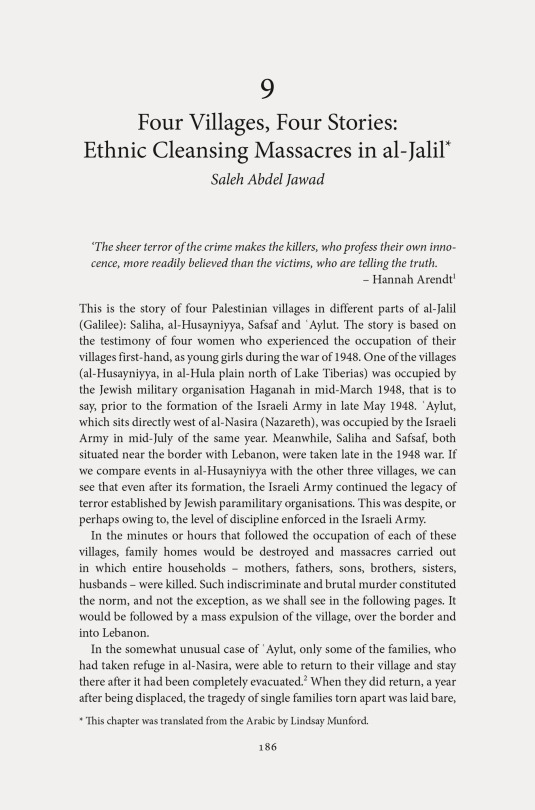
Saleh Abdel Jawad (صالح عبد الجواد), Four Villages, Four Stories: Ethnic Cleansing Massacres in al-Jalil [translated from the Arabic by Lindsay Munford], in Voices of the Nakba. A Living History of Palestine, Edited by Diana Allan, Translations by Hoda Adra, Rayya Badran and Lindsay Munford, with the assistance of Farah Atoui, Jessica Hollows and Cynthia Kreichati, Foreword by Mahmoud Zeidan, Afterword by Rosemary Sayigh, Pluto Press, London, 2021, pp. 186-194 [Publishers for Palestine]
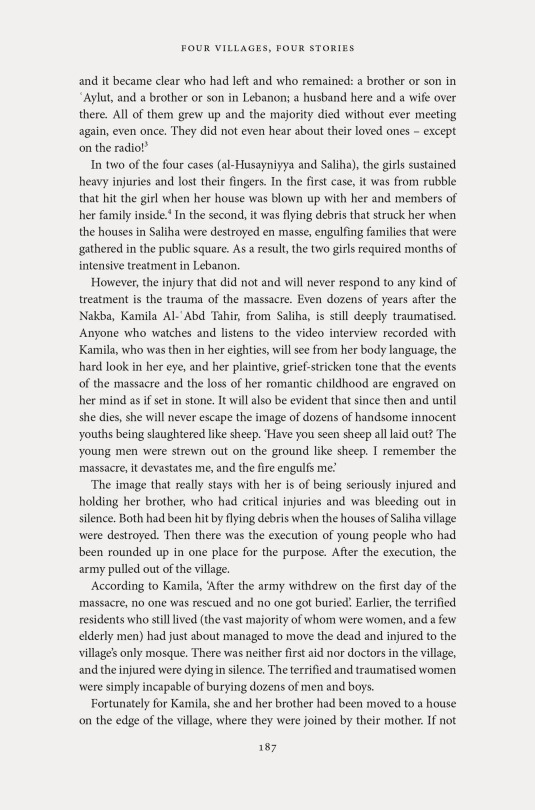
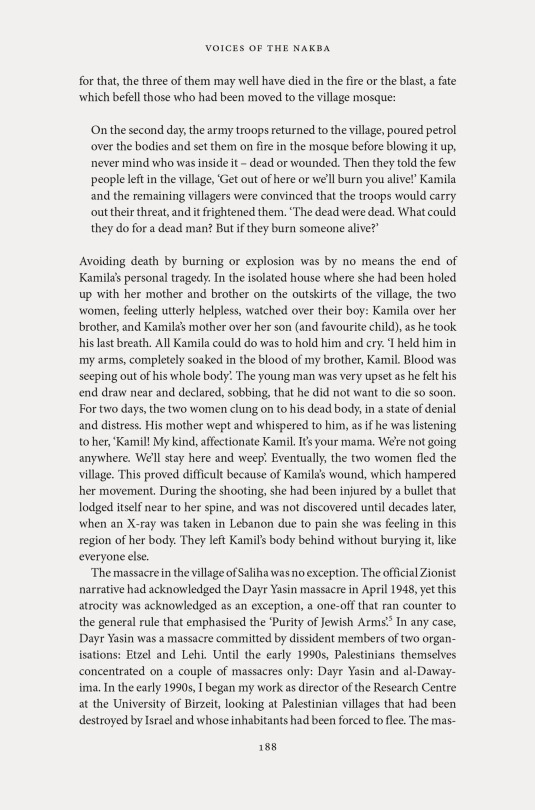
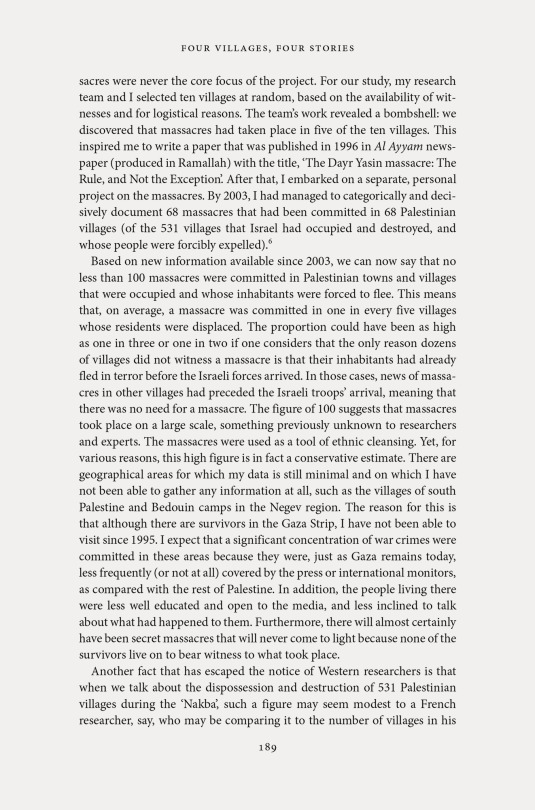
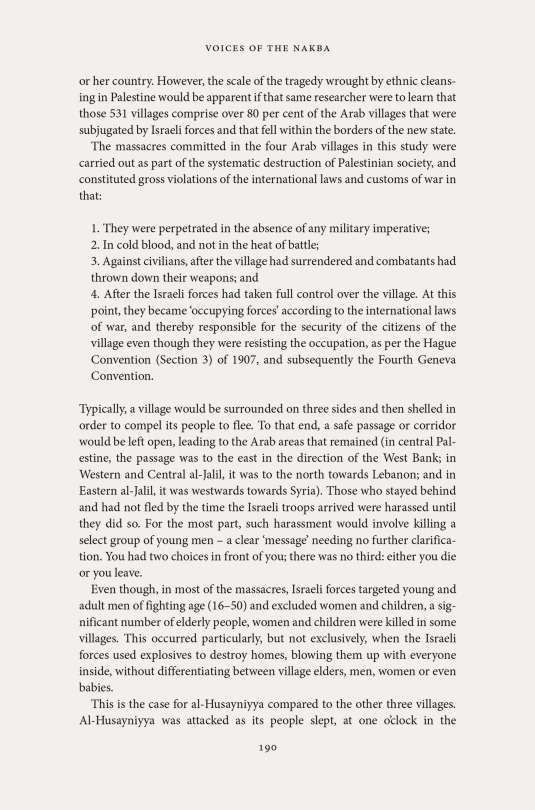
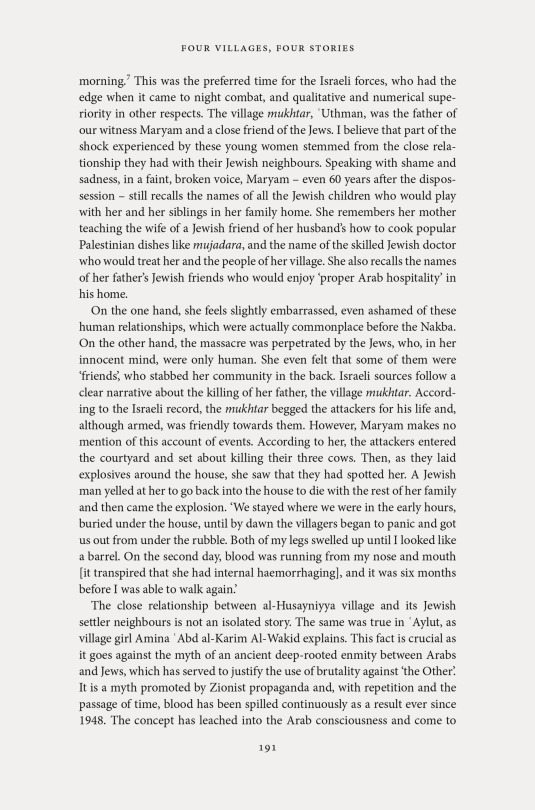
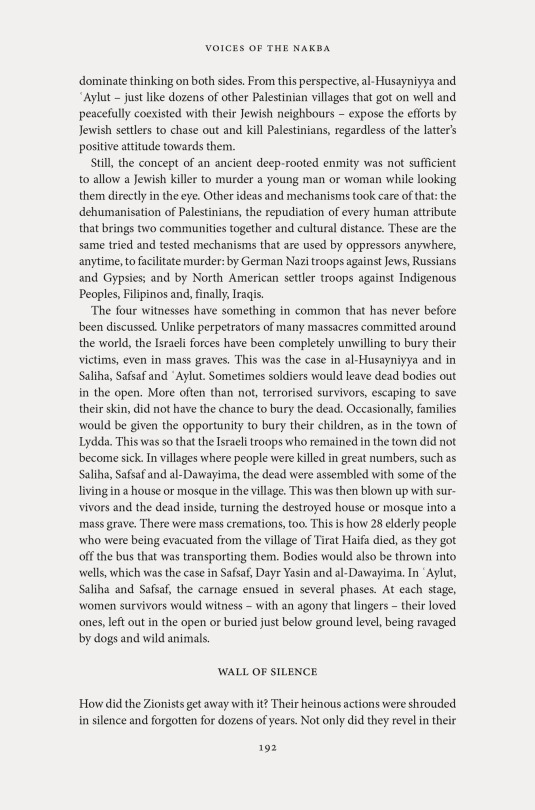
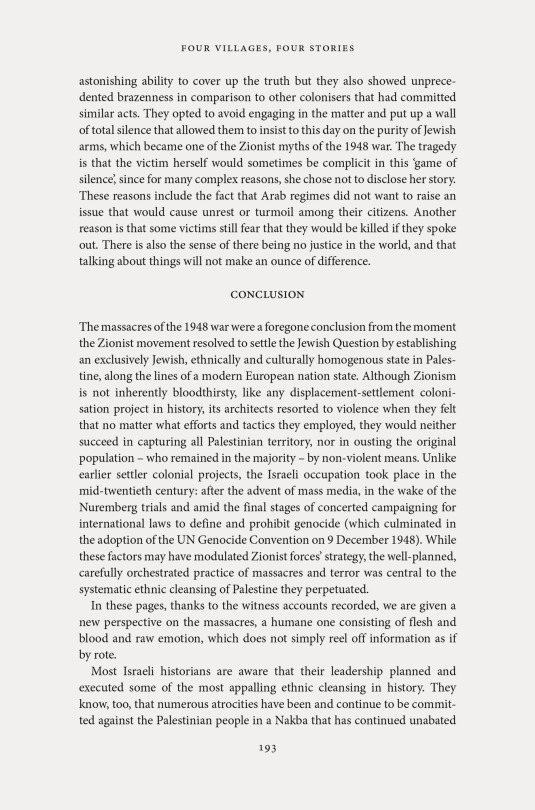
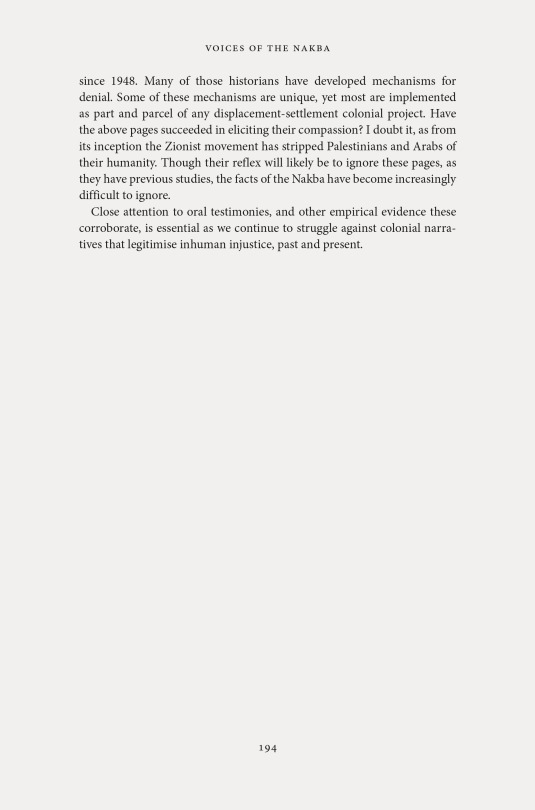
#graphic design#history#historiography#book#saleh abdel jawad#diana allan#hoda adra#rayya badran#lindsay munford#mahmoud zeidan#rosemary sayigh#pluto press#publishers for palestine#2020s
20 notes
·
View notes
Text
194 days have passed since the beginning of Al-Aqsa Flood. Over 6 months of unyielding resistance and painful massacres, Gaza, heart of the nation, stands tall in the face of the occupier.
Half a year in, it is vital not to lose sight of the battle's goal amidst the daily massacres.
When the resistance launched its operation, and thousands of rockets illuminated the sky of Palestine, what we heard was: I reclaim my land.
However, the resistance did not declare it as the war of liberation. As our fighters, the children of Palestine, returned to the lands they and their ancestors were forbidden from entering, the resistance said: our prisoners.
Our prisoners. Our fathers, our mothers, our brothers, our sisters, and our children. The fighter, the farmer, the worker, the sick, and the wounded. Those who are behind bars, often without charge nor trial, with the ability to lead, organize, and mobilize.
Our resistance declared: Freedom for our prisoners, for their freedom is tantamount to the liberation of the land. Deep-rooted, unremovable, inherent.
Hamas leader Omar Barghouti, both father of a martyr and of a prisoner, and brother of prisoner Nael Barghouti, once stood in Ramallah shouting, "If the the prisoner is lost, the nation is lost."
The resistance heard this call. Long understood, it has prepared for years to respond to it. On the 7th of October, it imposed our cause on the world again, writing with bullets and blood that the liberation of the land first passes through the liberation of our prisoners.
Thus, RNN Prisoners is introducing a new series to introduce you to our heroes behind bars, those who are more free than us all. Starting tomorrow, we will be sharing profiles of our captive leaders from across the Palestinian spectrum so that you may get to know them.
- RNN Prisoners
Follow RNN Prisoners on Telegram to follow this series
19 notes
·
View notes
Note
You say change happens at the state level, and it sure can, but state level change can be blocked by district courts. The 5th circuit has recently made it extraordinarily hard to protest in their jurisdiction, for example, and other courts could follow suit. The Supreme Court is unlikely to directly oppose popular will again given their tenuous legal standing to do so, but the district courts are well within their rights to declare any state change unconstitutional. While the SCJs are mostly solidified, people leave district and appellate courts all the time. As of writing Trump appointed ~450 judges to district courts, and Biden has appointed 194. Local and state level change is important, but the President does more than command the military and sign bills
Why should I care about that? My concern is for the people most affected by American imperialism , my Latino siblings oppressed at the border and the people of Palestine being oppressed with American weapons.
Us in the imperial core do face serious issues but nothing as sever as they do.
Idgaf about all that shit my point is change is easier at the state level, not perfect nor realistic. Sure a hell of a lot more realistic than the president. You can’t vote change in. I can’t vote in a president who will stop deporting my people, both parties hate us.
10 notes
·
View notes
Text
THREAD: Israel recently released documents revealing responses to Dec 2000 Clinton Parameters. They corroborate Clinton & leading US, Israeli negotiators & Saudi Prince Bandar: Israel accepted parameters, Palestinians & Arafat did not rejecting 2 states. Here is an analysis:
Palestinian negotiating team document is included with Israeli doc release. It's concluding sentence: "We cannot, however, accept a proposal that secures neither the establishment of a viable Palestinian state nor the right of Palestinian refugees to return to their homes." 2/
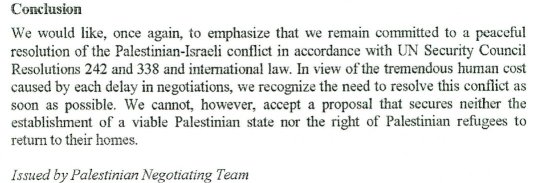
As recounted in detail by Prince Bandar in this interview corroborated by Clinton & others (eg Dennis Ross) Arafat did not show up to meeting with Clinton to deliver a response & lied to Bandar about it. Here is what Bandar said about Pal rejection: 3/ https://t.co/VJMM7Hk2Yd
youtube

Pals will not compromise on "right" of return despite some claims that Pals don't mean it literally. They always have, they did here & still do. Literally. While Pal document says we're "prepared to think flexibly & creatively about mechanism for implementing right of return" 4/
It still makes 100% clear: "The US proposal reflects a wholesale adoption of the Israeli position that the implementation of ROR be subject entirely to Israel's discretion. It is important to recall that Resolution 194, long regarded as the basis for a just settlement..." 5/
"of the refugee problem, calls for the return of Palestinian refugees to 'their homes,' wherever located - not to their 'homeland' or to 'historic Palestine." -- Thus clearly in opposition to CORE position of Clinton Parameters which is shown below: 6/
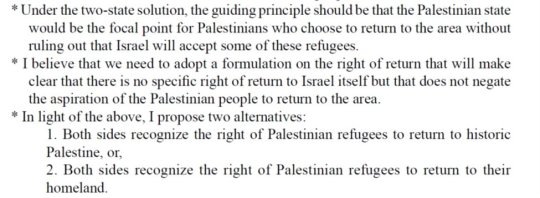
Clinton understood that 2-state solution not possible if millions of Palestinians could, against the will of Israel, literally move inside Israel. The Palestinian response made clear that anything less would not be acceptable, thus rejecting Clinton Parameters & statehood. 7/
There is more to the Palestinian position (they claim territory would not make viable state despite 94-96% of WB + swaps of up to 3% + safe passage to Gaza) but the refugee issue is absolute & clear rejection of Clinton Parameters. What about Israel? 8/
The Clinton Parameters were meant to set up a framework for further discussions based on key items to be accepted in advance – like ROR & Temple Mount sovereignty. Everyone knew more details had to be discussed & agreed. But Israel AGREED to these key "parameters" by Clinton. 9/
The Israeli document noted elements outlined by the President that differ from the Israeli positions" and lists them, but DOES NOT therefore reject parameters. This is how the Israeli response put it: 10/

The Israeli response then outlined more detail that Israel believed would need to be discussed in next round of negotiations. But importantly: "the attached points DO NOT CALL INTO QUESTION the internal logic of the President's ideas" -- meaning WITHIN Clinton Parameters. 11/
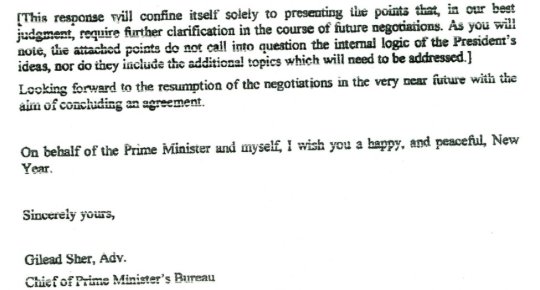
On the issue of Temple Mount, Israel clearly accepted split sovereignty as proposed by Clinton. Recent news articles focused on this as a big revelation, but it's old news as we know Israel accepted Clinton Parameters. Here is the language on this topic in Israeli response: 12/

On refugees Israeli accepted Parameters which of course Palestinians rejected. Pals made clear they won't agree to peace unless Israel agrees, against its sovereign rights, that millions of Pals can "return." What can thus be called the "two Palestinian state solution" 13/
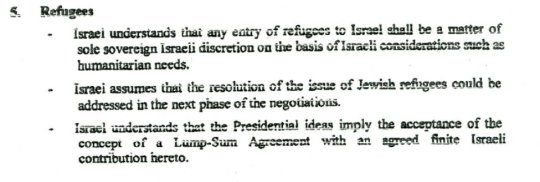
Revisionists absolve Arafat, cannot accept Israel agreed to 2 states & lie that "both sides" had reservations contradicting Parameters; e.g. Israel-hater Mehdi Hassan argued with Martin Indyk in 2016 that "both sides" had reservations (see 31:30) 14/

Link
Here is the discussion below. The obnoxious Hassan lectures Indyk, the American negotiator who was literally in the room at the time, that he doesn’t actually know what happened! Hassan knows better! Indyk corroborates that Israelis accepted Clinton Parameters. 15/
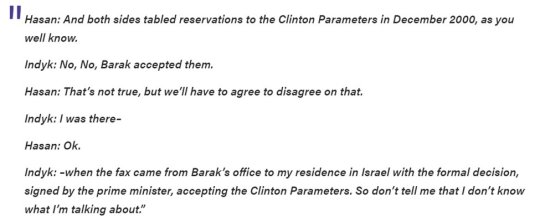
But of course the "Great Omission" will continue erasing Barak & Olmert's statehood offers to push fabricated narrative of "permanent occupation" "intent to dominate" & "apartheid" -- as statehood offers & Pal rejections demolish this demonizing narrative of Israeli evil. END
Aizenberg
@Aizenberg55
23 notes
·
View notes
Text
Before I post this, I do not want any antisemitism on this post.
From the UN website:
The Nakba, which means “catastrophe” in Arabic, refers to the mass displacement and dispossession of Palestinians during the 1948 Arab-Israeli war. Before the Nakba, Palestine was a multi-ethnic and multi-cultural society. However, the conflict between Arabs and Jews intensified in the 1930s with the increase of Jewish immigration, driven by persecution in Europe, and with the Zionist movement aiming to establish a Jewish state in Palestine.
In November 1947, the UN General Assembly passed a resolution partitioning Palestine into two states, one Jewish and one Arab, with Jerusalem under a UN administration. The Arab world rejected the plan, arguing that it was unfair and violated the UN Charter. Jewish militias launched attacks against Palestinian villages, forcing thousands to flee. The situation escalated into a full-blown war in 1948, with the end of the British Mandate and the departure of British forces, the declaration of independence of the State of Israel and the entry of neighbouring Arab armies. The newly established Israeli forces launched a major offensive. The result of the war was the permanent displacement of more than half of the Palestinian population.
As early as December 1948, the UN General Assembly called for refugee return, property restitution and compensation (resolution 194 (II)). However, 75 years later, despite countless UN resolutions, the rights of the Palestinians continue to be denied. According to the UN Relief and Works Agency for Palestine Refugees (UNRWA) more than 5 million Palestine refugees are scattered throughout the Middle East. Today, Palestinians continue to be dispossessed and displaced by Israeli settlements, evictions, land confiscation and home demolitions.
The Nakba anniversary is a reminder not only of those tragic events of 1948, but of the ongoing injustice suffered by the Palestinians. The Nakba had a profound impact on the Palestinian people, who lost their homes, their land, and their way of life. It remains a deeply traumatic event in their collective memory and continues to shape their struggle for justice and for their right to return to their homes. In 2022, the UN General Assembly requested that this anniversary be commemorated on 15 May 2023, for the first time in the history of the UN.
Source:
#palestine#israel#middle east#war#nakba#awareness#displaced persons#genocide#it's illegal to talk about this in Israel.
11 notes
·
View notes
Text
IH: It’s true, international law is meaningless if there is no political will to enforce it. And the discourse of human rights has always failed peoples of the global south: it was produced almost entirely by Europeans, did not address coloniality, and it took the nation state as the framework without accounting for indigenous peoples and their rights, for example.
Also, the Declaration of Human Rights was written and ratified in 1948, the same year as the Nakba [“the catastrophe”] and the founding of Israel. This is sort of a weird fact. That same year 750,000 Palestinians were driven from their homes, and meanwhile the UN was signing this abstract document about universal principles. Then Israel was admitted into the UN on condition that it implement resolutions 181, on internationalising Jerusalem, and 194, which “resolve[s] that the refugees wishing to return to their homes and live at peace with their neighbours should be permitted to do so at the earliest practicable date, and that compensation should be paid for the property of those choosing not to return”. Obviously, Israel did not do any of this. So from the very beginning, the “universality” of this declaration was questionable and the people who immediately fell out of its purview were the Palestinians.
Even if the origin of the discourse itself is flawed, though, should not protecting human rights still be some kind of baseline? I know the discourse comes out of the UN, which came out of the League of Nations, which came out of European imperial power, and the whole system needs an overhaul, but is it not at least one implement, one framework that is broadly legible across different countries, that might, if actually applied, be used to restrain an otherwise pretty horrible “might is right” attitude of post-imperial or neo-imperial nation states hungry for power? Do you think this is outweighed by the way that human rights discourse ends up functioning like a fig leaf for the crimes of the powerful?
Speech in support of Palestinian rights in the west has been repressed for a long time, but it’s true that the repression is happening more in the open now, and it is happening at scale. I do think the backlash is a sign of fear: repressing speech is an indication that speech is powerful. And perhaps it happens more at moments when speech is seen as particularly powerful (which would explain the change you experienced).
Whether we should be optimistic, though, I don’t know. It’s good to feel encouraged, so long as that doesn’t lead to complacency. Solidarity with Palestinians may be waking up in what you call the “imperial core” (which is also what I think people are often referring to when they talk about “the international community” –especially the US, the UK, France and Germany), but at what cost? The numbers killed, maimed, people without any family, small children without parents… the mass graves. At the moment international solidarity has not even produced the bare minimum: a ceasefire. The bombs are still falling. My heart breaks every day. It’s unbearable.
‘The bombs are still falling. My heart breaks every day’: novelists Sally Rooney and Isabella Hammad on the Israel-Palestine conflict
4 notes
·
View notes
Text
Many professing solidarity with Palestinians — including alleged legal experts — being slaughtered in Gaza have said they have “nowhere to go”.
It’s not true.
They do.
Somewhere they actually should go.
Their homes in what is now Israel.
The majority of families of Palestinians in Gaza were forced there by Israel in 1948.
See great thread by Hanine Hassan: “Who told you that the 1.5 million displaced Palestinians sheltering in Rafah have nowhere left to go? My family, now in Rafah, has a home in Jaffa, from which we were expelled by a fascist German family. The majority of our people in Gaza have homes to go to, all over Palestine.”
As Prof. John Quigley has noted: “They are entitled to repatriation under international law, including the International Convention on the Elimination of All Forms of Racial Discrimination which Israel has signed and ratified.” See his writing on this subject here and here.
And of course there’s UN Resolution 194 of Dec. 11, 1948 which “Resolves that the refugees wishing to return to their homes and live at peace with their neighbours should be permitted to do so at the earliest practicable date, and that compensation should be paid for the property of those choosing not to return…”
The extremely pro-Israel Harry Truman would state the following year that if “Israel continues to reject the basic principles set forth” in that UN resolution, the US government “will regretfully be forced to the conclusion that a revision of its attitude toward Israel has become unavoidable.” (See below re JFK.)
2 notes
·
View notes
Text
MJ Final Data
Content Rivers 2020-2021
Africa
Egypts 5298.6 – nile
Nigeria 4,665.8 —--niger
South africa 3452 —tugela
Algeria 2852.4 —-- cheliff
Morocco 1699.4 sebou
Senegal 1,396 sine
Tunisia 1282.8 majardah
Côte d'ivoire 1066 —-bandama
Somalia 556.4 shebelle
Ghana 501.8 —--volta
Angola 342.6 —cuanza
Comoros 318
Liberia 310.8 —--cavally
Mauritius 306
Libya 289.2
Tanzania 266.2 -----rufiji
Mozambique 252 ------limpopo
Benin 355.8 ------oueme
Sierra leone 199.4
Togo 194 ------mono
Madagascar 189.2
Cameron 151.8 —-----sanaga
Sudan 125.6 —------baraka
Kenya 124.2 —----galana
Guinea -bissau 111
Gambia 107.4 —------gambia
Guinea 101.4
Djibouti 95
Congo 91.8
Eritrea 89
Dr congo 83.4 —----------congo
Mauritania 76
Capa verde 51.2
Gabon 33.4
Equatorial guinea 32.8
Namibia 30 —--------- orange
Sao tome 27.8
Seychelles 25.4
Reunion 4.6
St Helena -6
Asia
China 48,326 yangtze
Indonesia 1,762.6 bengawan solo
Philippines 10,321.4 —pampanga
Vietnam 10048.4 —--mekong
Sri lanka 8718.8 —-moha oya
Thailand 5,631.4 —-chao phraya
Malaysia 5,133.2 —- langat
Bangladesh 4,314.2
India 3286.6 ganges
Turkey 2,662.6 orantes
Pakistan 2632.8 indus
Myanmar 2,511 irrawaddy
North korea 1667.6 taedong
Iran 1355.6
Yemen 927 — wadi mawr
Syria 865.2
Japan 784.2
Lebanon 262 – kebir
Taiwan 250.6 —---- jiaoxi
South korea 185
Maldives 172.4
Cambodia 162.6
Hong Kong 156.2
East timor 113.4
Saudi Arabia 112.6
Israel 104.2
Iraq 85.2 shatt al-arab
Kuwait 63
Singapore 35.5
Palestine 30.6
Oman 25.6
Bahrain 24
Emirates 16.6
Jordan 9
Qatar 4.2
Macao 3.8
Brunei -6
Christmas island -02
Cocos island -006
Europe
Ukraine 705.6 dnieper
Russia 442.6 amur
United kingdom 370.2
Spain 251.2
Italy 179
Germany 171.2 elbe
Albania 162.8 drini
Netherland 151.8 rhine
France 132.2
Bulgaria 102.6
Croatia 90.2
Portugal 89.8
Poland 86 vistula
Georgia 79.4
Greece 78 evros
Bosnia 71
Ireland 64.3
Latvia 56.4
Norway 46
Estonia 32.8
Finland 27.4
Montenegro 24.2
Romania 19.8 Danube
Lithuania 19 nemanus
Belgium 15
Malta 14.4
Sweden 11.8
Cyprus 10
Denmark 9.8
Iceland 3.2
Slovenia 3
Channel island -16
Jersey -10
Isle of man -8
Guernsey -6
Faroe island –6
Gibraltar –4
Monaco –4
Dhekelia -2
Svalbard –0010
North America
United states 1509.2 mississippi
haiti 806
El salvador 650.6 lempa
Dominican republic 647.8
Mexico 555.4 grijalva
Honduras 524 ulua
Trinidad 515.4
Guatemala 501 matagua
Cuba 496.6
Nicaragua 462.6
Costa rica 230.6 grande de tarcoles
Panama 188.4
Puerto rico 90.6
Jamaica 54.8
Canada 43.6 st lawrence
Santa lucia 36.8
Guadeloupe 36
Belize 21.4
Barbados 19
Grenada 12.4
St Vincent 12.2
Bahamas 7.4
Antigua 6.8
Dominica 4.2
Martinique 4.2
Sr kitts 4
Netherland 2.2
Us island -14
Bermudas -6
Greenland -6
Cayman islands -6
St maarten -4
British islands -4
Anguilla -2
Turks island -2
Montserrat -2
St Pierre -0.6
Oceania
Papua 492.2 purari
Fiji 270 ba
Vanuatu 123.2
Solomon island 111.8
Australia 76.2
New zealand 51
Tonga 36.2
Samoa 28
Micronesia 26.2
Marshall island 17.4
Kiribati 16.6
French polynesia 7
Palau 4
Nauru 3
New caledonia 2.6
Tuvalu 2.6
Cook island 2.2
Guam 2.2
Mariana island -12
Norfolk island -4
Tokelau -2
Niue -0.2
South america
Brazil 2583 amazon
Peru 1065.4 rimac
Argentina 864.6 parana
Ecuador 599.4 esmeraldas
Venezuela 560.8 orinoco
Colombia 505 magdalena
Guyana 230.2
Chile 119.2
Uruguay 118.2 uruguay
Suriname 21.6
Guiana french 13
Aruba 2
Curacao -14
Falkland island -0.2
0 notes
Text
CE 1948, 12: Resolution 194 is passed affirming Palestinian right to return
UN General Assembly passes resolution 194 calling for refugees to be allowed to return, Jerusalem to be under international regime, UN Conciliation Commission for Palestine (UNCCP) replaces UN mediator.
View On WordPress
0 notes